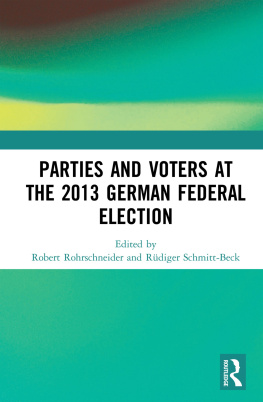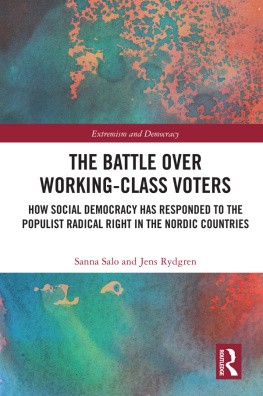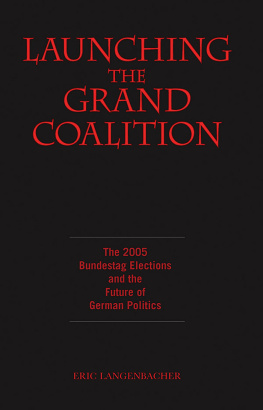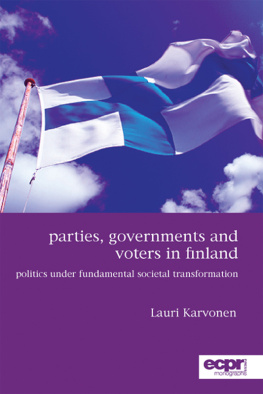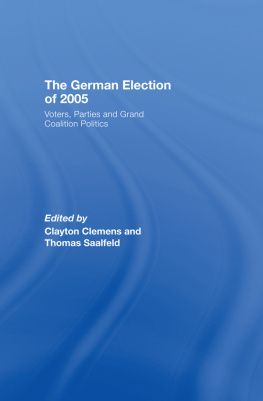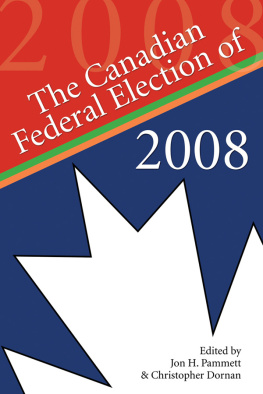Parties and Voters at the 2013
German Federal Election
The 2013 federal election in Germany took place amidst considerable uncertainty over the EUs economic crisis. Financial rescue packages for several countries required the provision of huge sums. Some EU-members barely avoided the economic abyss. Germany, however, was spared much of the hardship as her economy produced record-levels of employment, exports boomed, and German state coffers began to see a budget surplus. Against this backdrop, this book examines the choices offered to voters by parties, and publics decision calculus. How did Germanys voter evaluate economic conditions and the Euro crisis? For example, is there a demand for a new party representing the rising EU-skeptical sentiments? How did long-term developments such as the weakening partyvoter ties affect the election outcome? What programs did parties offer to voters in the election? The book brings together several leading experts of German and European politics to address these questions.
This book was originally published as a special issue of German Politics.
Robert Rohrschneider is Sir Robert Worcester Professor of Political Science at the University of Kansas, USA. His current research focuses on political representation in advanced industrial democracies.
Rdiger Schmitt-Beck is Professor of Political Science and Political Sociology at the University of Mannheim, Germany. He is chairperson of the German Society for Electoral Research (DGfW) and one of the principal investigators of the German Longitudinal Election Study (GLES).
Parties and Voters at the 2013
German Federal Election
Edited by
Robert Rohrschneider and Rdiger Schmitt-Beck
First published 2018
by Routledge
2 Park Square, Milton Park, Abingdon, Oxon, OX14 4RN, UK
and by Routledge
711 Third Avenue, New York, NY 10017, USA
Routledge is an imprint of the Taylor & Francis Group, an informa business
2018 Association for the Study of German Politics
All rights reserved. No part of this book may be reprinted or reproduced or utilised in any form or by any electronic, mechanical, or other means, now known or hereafter invented, including photocopying and recording, or in any information storage or retrieval system, without permission in writing from the publishers.
Trademark notice: Product or corporate names may be trademarks or registered trademarks, and are used only for identification and explanation without intent to infringe.
British Library Cataloguing in Publication Data
A catalogue record for this book is available from the British Library
ISBN 13: 978-1-138-56680-4
Typeset in Times New Roman
by RefineCatch Limited, Bungay, Suffolk
Publishers Note
The publisher accepts responsibility for any inconsistencies that may have arisen during the conversion of this book from journal articles to book chapters, namely the possible inclusion of journal terminology.
Disclaimer
Every effort has been made to contact copyright holders for their permission to reprint material in this book. The publishers would be grateful to hear from any copyright holder who is not here acknowledged and will undertake to rectify any errors or omissions in future editions of this book.
Contents
Citation Information
The chapters in this book were originally published in German Politics, volume 26, issue 1 (March 2017). When citing this material, please use the original page numbering for each article, as follows:
Introduction
Introduction: Parties and Voters at the 2013 German Federal Election
Robert Rohrschneider and Rdiger Schmitt-Beck
German Politics, volume 26, issue 1 (March 2017), pp. 111
Chapter 1
Social Cleavages and Electoral Behaviour in Long-Term Perspective: Alignment without Mobilisation?
Martin Elff and Sigrid Roteutscher
German Politics, volume 26, issue 1 (March 2017), pp. 1234
Chapter 2
An Angela Merkel Effect? The Impact of Gender on CDU/CSU Voting Intention between 1998 and 2013
Marc Debus
German Politics, volume 26, issue 1 (March 2017), pp. 3548
Chapter 3
Another Dog that didnt Bark? Less Dealignment and more Partisanship in the 2013 Bundestag Election
Kai Arzheimer
German Politics, volume 26, issue 1 (March 2017), pp. 4964
Chapter 4
Merkwrdig oder nicht? What Economic Voting Models and the 2013 Bundestag Elections Have to Say about Each Other
Katsunori Seki and Guy D. Whitten
German Politics, volume 26, issue 1 (March 2017), pp. 6582
Chapter 5
Party Positions about European Integration in Germany: An Electoral Quandary?
Robert Rohrschneider and Stephen Whitefield
German Politics, volume 26, issue 1 (March 2017), pp. 83103
Chapter 6
Instrumental and Expressive Coalition Voting: The Case of the FDP in the 2009 and 2013 German Federal Elections
Sascha Huber
German Politics, volume 26, issue 1 (March 2017), pp. 104123
Chapter 7
The Alternative fr Deutschland in the Electorate: Between Single-Issue and Right-Wing Populist Party
Rdiger Schmitt-Beck
German Politics, volume 26, issue 1 (March 2017), pp. 124148
Chapter 8
If You Dont Know Me by Now: Explaining Local Candidate Recognition
Heiko Giebler and Bernhard Weels
German Politics, volume 26, issue 1 (March 2017), pp. 149169
Chapter 9
Correct Voting at the 2013 German Federal Election: An Analysis of Normatively Desirable Campaign Effects
Ben Christian
German Politics, volume 26, issue 1 (March 2017), pp. 170186
For any permission-related enquiries please visit: http://www.tandfonline.com/page/help/permissions
Notes on Contributors
Kai Arzheimer is Professor of Political Science and Head of the German Politics and Political Sociology unit at the University of Mainz, Germany. He has published widely in the field of political parties, electoral behaviour and quantitative methods.
Ben Christian is MA candidate at the Faculty of Social Sciences at the University of Mannheim, Germany.
Marc Debus is Professor of Comparative Government at Mannheim University, Germany. His research interests include political institutions, in particular, multilevel systems and their effects on the political behaviour of voters and legislators, party competition, coalition politics and decision making within parliaments and governments.
Martin Elff is Professor of Political Sociology at Zeppelin University, Germany. His research interests are in comparative politics, political behaviour and political methodology. He has published on various topics within these fields in journals such as Electoral Studies, German Politics, Perspectives on Politics and Political Analysis.
Heiko Giebler is a Research Fellow at the WZB Berlin Social Science Center, research unit Democracy and Democratisation, and he is working in the German Longitudinal Election Study (GLES). His research focuses on electoral behaviour, political parties, political elites and applied quantitative methods.


